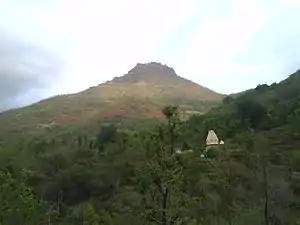Mangalgad
Mangalgad, also known as Kangori, is a fort in Maharashtra near the village of Dudhanewadi.[1] Kangori, or Mangalgad Fort, is in the Mahad sub-division about eleven miles (18 km) east by south from Mahad town.
| Mangalgad Fort/ Kangori Fort | |
|---|---|
मंगळ गड / कांगोरी गड | |
| Part of Sahyadri Hill Range | |
| Raigad district, Maharashtra | |
 Kangorigad on the Kangorimal | |
 Mangalgad Fort/ Kangori Fort  Mangalgad Fort/ Kangori Fort | |
| Coordinates | 18°03′05.5″N 73°34′45.7″E |
| Type | Hill fort |
| Height | 2475 Ft. |
| Site information | |
| Owner | Government of India |
| Controlled by |
|
| Open to the public | Yes |
| Condition | Ruins |
| Site history | |
| Materials | Stone |
How to reach
The fort is built on the top of a steep and treeless spur of the Sahyadris, 2,457 feet (749 m) high, and is reached by a narrow and rugged path about two miles long. The fort is 1,485 feet (453 m) from east to west and 264 feet (80 m) from north to south.[1] It takes about 2 hours trekking time to reach the fort from the base village Dudhanewadi.[2]
History
Mangalgad was built by Chandrarao More of Jawli. It was one of seven forts captured by Shivaji in 1648. It was the place of confinement of Chitursing the brother of the Raja of Satara, from 1812 till his death in 1818. In 1817 Cornets Hunter and Morrison, two English officers on the Madras establishment, on their way from Hyderabad to Poona with a small escort were caught at Uruli twenty miles east of Poona, and imprisoned here. Some time after, by Gokhla's orders, they were removed to Vasota in Satara, and, on the destruction of that fort in April 1817, they were restored to freedom. In 1818 Kangori was taken by Colonel Prother, after the fall of Raigad fort.[1]
Places to see
The buildings and the gateway are in ruins but a part of the rampart remains. Within the rampart is a ruined temple and a rock-cut cistern, but no building of any size or interest. Mangalgad consists of a single temple, called Kangori Devi Temple, with cisterns at the top. The wada and prison are both in ruins.[1]
References
- Gazetteer of the Bombay Presidency: Kola'ba and Janjira. 11. Govt. Central Press. 1883. p. 323. Retrieved 29 July 2009.
- trekshitiz. "Mangalgad". www.trekshitiz.com. trekshitiz. Retrieved 29 April 2020.
See also
| Wikimedia Commons has media related to Mangalgad. |
- List of forts in Maharashtra
- List of forts in India
- Baji Prabhu Deshpande
- Marathi People
- Maratha Navy
- List of Maratha dynasties and states
- Maratha War of Independence
- Battles involving the Maratha Empire
- Maratha Army
- Maratha titles
- Military history of India
- List of people involved in the Maratha Empire